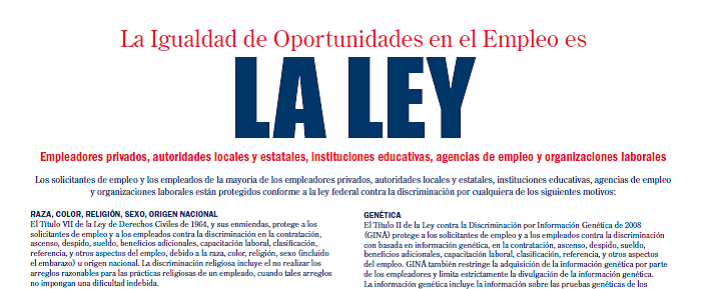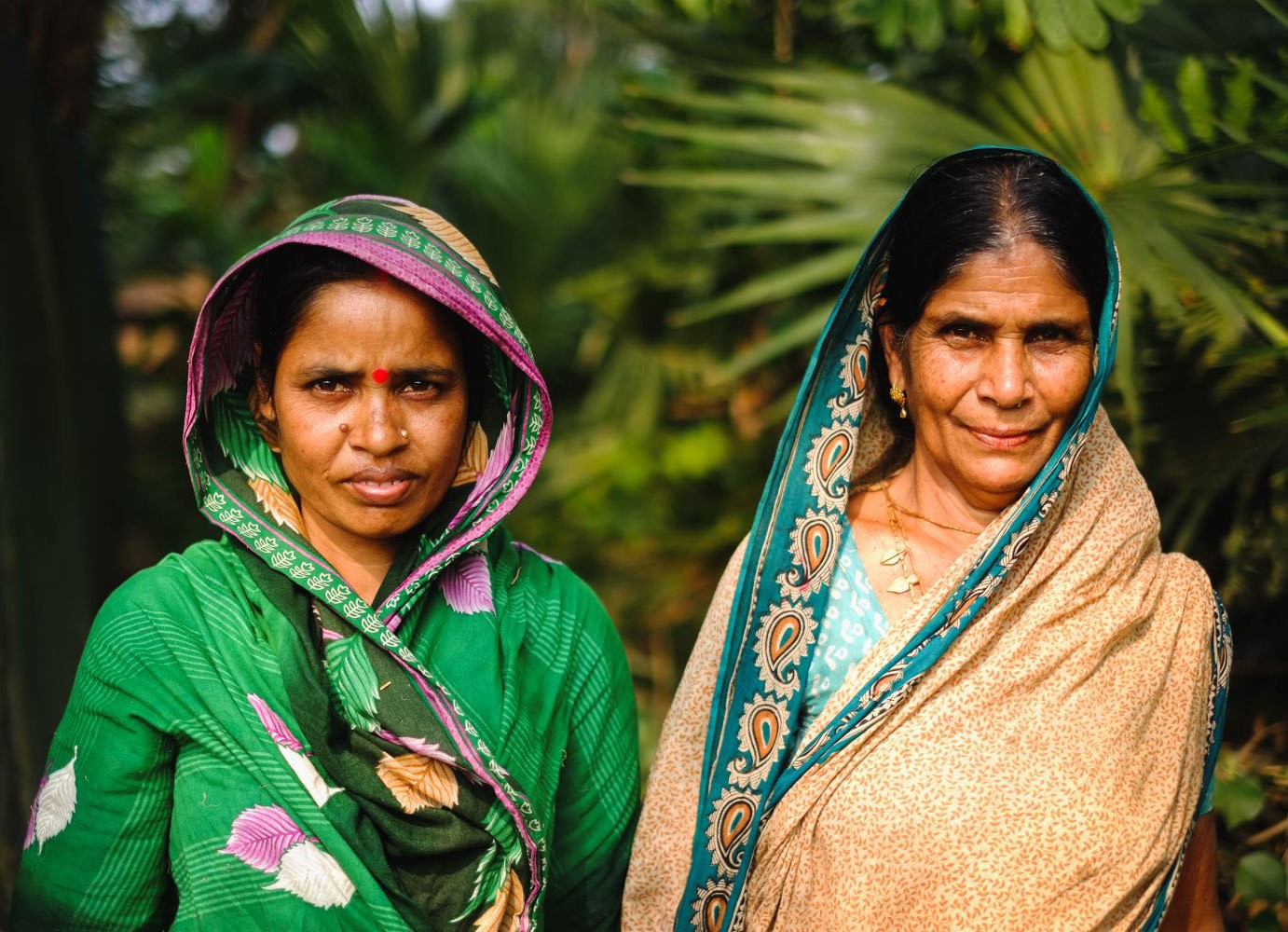Imagine you are a Guatemalan living and working in the United States without the proper documents. Almost certainly (because it is legally required) there is a poster in the place where you work—most likely in English and Spanish—that “Equal Opportunity is the Law” and that you are protected from discrimination “on the basis of race, color, religion, sex (including pregnancy), or national origin.”

And, perhaps on the same bulletin board and also in Spanish will be another poster telling you that the place participates in “E-verify” so that the I-9 form you provided to the employer will be shared with the DHS in order to verify your legal authorization to work in the United States. This legal authorization discriminates blatantly and openly on the basis of national origin. Everyone who is born in the USA is eligible to work legally in the USA. (Almost) no one who is born in Guatemala is authorized to work in the USA. National origin is fundamentally what one is discriminated on in migration law.

As a person from Guatemala without work authorization you came to America to work and make money and to improve your life. But you have to live in the legal shadows and suffer indignities of many kinds due to legally mandated discrimination against you based on your national origin. What are you to make of these posters? Is this some sick, twisted joke? They need to add insult to the injury of not allowing me to work legally in their country by telling me in Spanish that I am protected from discrimination in employment based on my national origin? Do these people not believe that words have meanings?
Discourse about “discrimination” and “national origin” reveals that, to paraphrase Lord Acton for modern times via Michel Foucault: “Power constructs and absolute power constructs absolutely.” Or, as Lewis Carroll put it in Through the Looking Glass, well before “deconstruction” was fashionable:
“When I use a word,’ Humpty Dumpty said in rather a scornful tone, ‘it means just what I choose it to mean — neither more nor less.’
’The question is,’ said Alice, ‘whether you can make words mean so many different things.’
’The question is,’ said Humpty Dumpty, ‘which is to be master — that’s all.”
The United Nations General Assembly is working on a set of Sustainable Development Goals and the latest version is in a report from the Open Working Group of August of 2014. Paragraph 4 lays out a fundamental premise of these goals for sustainable development:
People are at the centre of sustainable development and, in this regard, in the outcome document, the promise was made to strive for a world that is just, equitable, and inclusive….to benefit all…without distinction of any kind such as age, sex, disability, culture, race, ethnicity, origin, migratory status, economic or other status.
What do we know about inequalities in the world? They are overwhelmingly driven by differences in where you were born. Branko Milanovic’s study of global inequality shows that roughly two thirds of the inequality in income/consumption is a person’s country of birth. Not their level of education, not their sex, not their parent’s income or social status, though all those play a role, just where they were born. Milanovic shows that in our world the “rich” (95th percentile) in poor countries are poorer than the “poor” in Denmark. Pritchett and Spivack (2013) show the “rich” (95th percentile) in many poor countries spend a much greater portion of their income on food than the “poor” in the OECD.
We know from both macro-economic and micro-economic evidence that most poor people are not poor because of who they are but where they are. If a person from a typical poor country is allowed to work in a rich country then, with exactly the same personal characteristics and “intrinsic” productivity, the person’s earnings will increase by 3 to 5 times.
If you had to pick one characteristic at birth of a person to best predict their health (indeed, their survival), their education (quantity and quality), their income, their access to water and sanitation, even their subjective life satisfaction, it is where they are born.
So a “people centered” document with a universal moral vision focused on “inclusion” (used 24 times), “rights” (used 16 times), “equality” (11 times) and reducing “poverty” (13 times) will naturally focus on the fact that rich countries have restrictive laws actively excluding from their territory people based on their national origin. Certainly the SDGs will advocate powerfully for more inclusive policies on labor mobility and migration to address the inequality and discrimination inherent in the existing global system. Right?
Wrong.
This UN General Assembly document shares the same Humpty-Dumpty logic in that “which is to be master” is all that matters. The goal that speaks most closely to labor mobility is under Goal 10 “Reduce inequality within and among countries”:
10.7 Facilitate orderly, safe, regular, and responsible migration and mobility of people, including through the implementation of planned and well-managed migration policies.
Suppose a prosperous country enacted a “planned” policy of zero labor mobility—no one from abroad was allowed to work in their country—and implemented that in an “orderly” manner that was “well-managed.” This is completely exclusive and completely discriminatory based on national origin. Yet it seems to be consistent with the loftiest ambition for 2030 that the General Assembly can declare.
Contrast 10.7 with Goal 5.1 “End all forms of discrimination against all women and girls everywhere.” Clear. Concise. Powerful. Over ambitious? Perhaps, perhaps not, but the SDGs are not afraid to articulate a moral vision.
Contrast 10.7 with Goal 17.12 “Realize timely implementation of duty-free and quota-free market access on a lasting basis for all least developed countries…” So the SDGs are not afraid of asking for greater mobility for all goods coming from developing countries.
Contrast 10.7 this with Goal 17.2 “Developed countries to implement fully their official development assistance commitments, including to provide .7 percent of gross national income…” The SDGs are willing to ask rich countries to act to address inequality in ways they have so far declined to do (ODA was only .3 percent of GNI in 2013 with only five countries meeting the .7 level) and are politically unlikely to do.
Power is not revealed merely in doing whatever you wish. Power is revealed by doing whatever you wish and having it be widely seen as the right, just, and moral thing to do. To judge by the draft SDGs, the forces against greater freedom for human beings to move across borders to make an honest living through work are spectacularly powerful. Rich countries are being told: “Discriminate massively on the basis of national origin to exclude people from your territory (albeit in a “safe” and “orderly” way) but send governments a bit more than a third of a penny on the dollar in ODA and the world is willing to call those goals for a ‘just, equitable, and inclusive’ world.” Words are so nice when one is the master.
Disclaimer
CGD blog posts reflect the views of the authors, drawing on prior research and experience in their areas of expertise. CGD is a nonpartisan, independent organization and does not take institutional positions.





